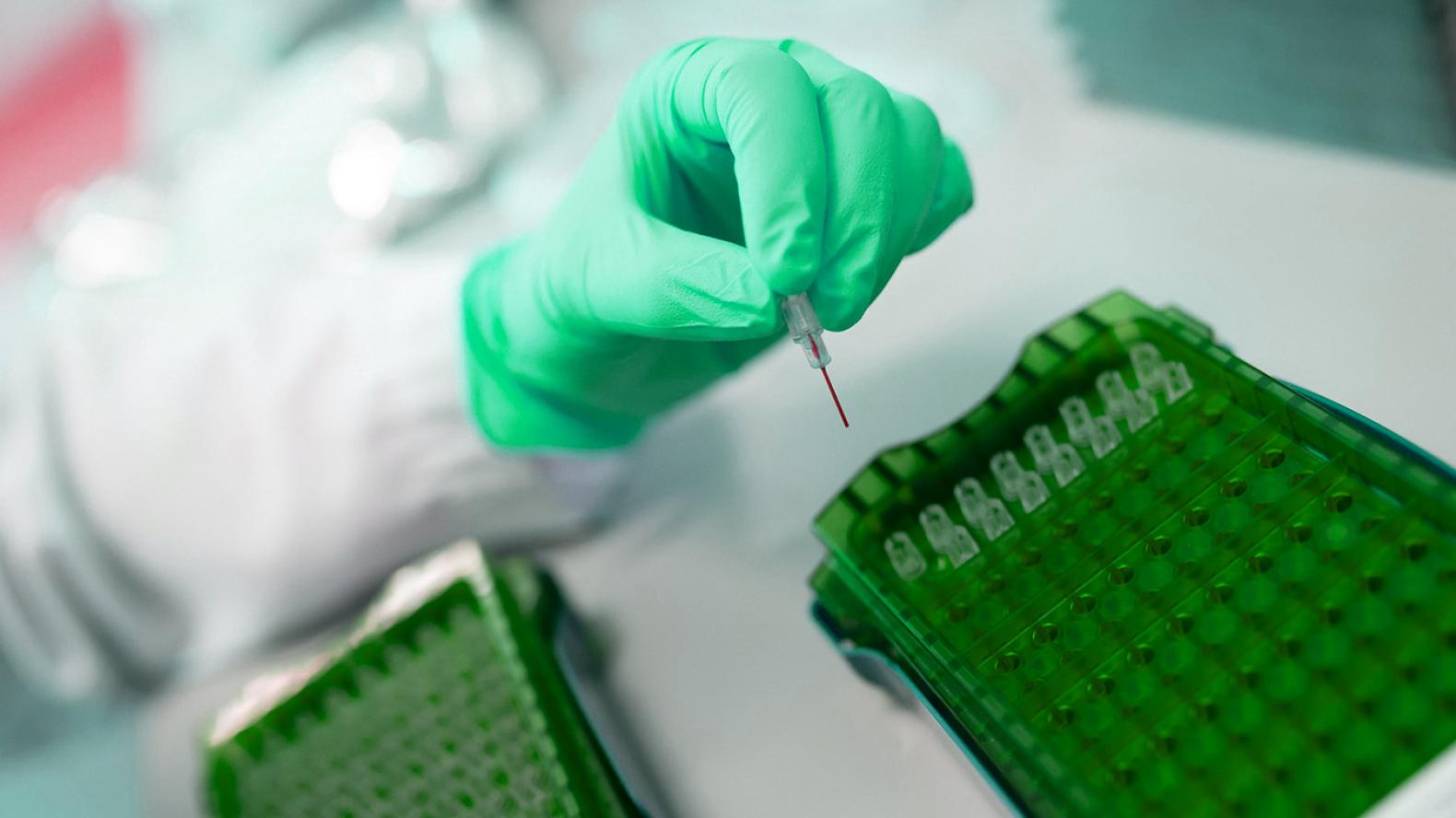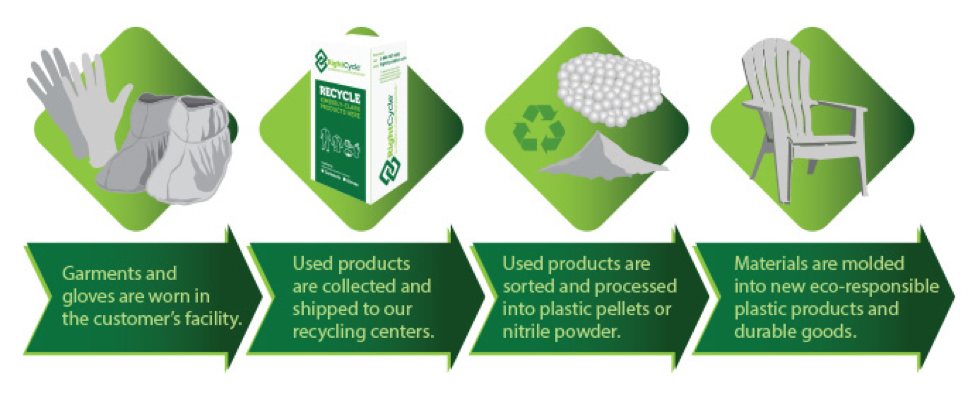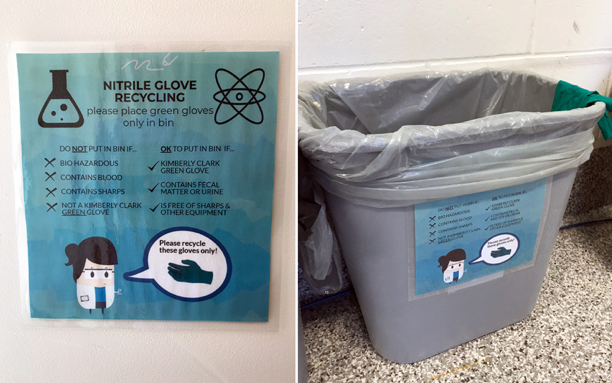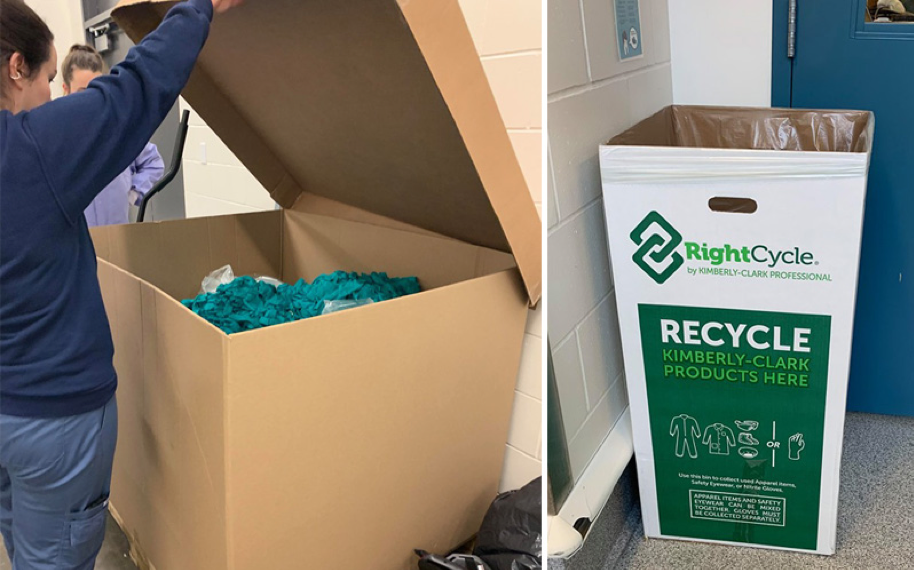
A pilot program for recycling nitrile gloves at the Centre for Comparative Medicine (CCM) has helped build the case for potentially diverting seven million gloves (28 tonnes) from the landfill each year if scaled up across campus.
The pilot of Kimberly-Clark Professional’s RightCycle Program was launched in Spring 2019 to test the feasibility and impact of recycling single-use nitrile gloves from UBC laboratories. Green Labs partnered with UBC’s scientific vendor VWR and glove manufacturer Kimberly-Clark to implement the program, which takes used non-hazardous gloves and recycles and repurposes them into new consumer goods such as outdoor furniture.
CCM was carefully selected as the location for the pilot due the facility’s standardized practices and a centralized purchasing structure which enabled a switch to mostly Kimberly-Clark gloves. The pilot represented a minimal change to previous glove disposal practices at CCM; the used non-hazardous gloves were placed into a recycling bin instead of the garbage. It is estimated that over 90% of the gloves used at CCM are considered non-hazardous. Green Labs worked closely with Operations and Purchasing managers at CCM, as well as two outstanding Sustainability Coordinators, to implement the pilot.
“The outcomes from this [pilot] will help the Green Labs Program and researchers advance more sustainable management of lab waste materials, which are often more challenging than many other types of waste, and are an emerging opportunity area,” said Bud Fraser, Senior Planning and Sustainability Engineer.

Championing the program
Varsha Rani and Emily Morton, animal care technicians and lab sustainability coordinators at CCM championed this program by training their fellow staff members to follow new collection guidelines, overseeing the day-to-day program operations, and by troubleshooting any issues that came up along the way.
“We encountered some minor hurdles during implementation due to the lack of awareness of the project. We overcame this through sending email communications and posting clear signage,” said Rani. “It was eventually successful and the overall consensus amongst the users showed that they were keen to participate in glove recycling. Their willingness to recycle made it easier for them to change their behavior surrounding the glove disposal.”

Measuring the impacts
After a year-long effort, the first pallet of used gloves is ready to be shipped for recycling. In addition to the reported participation and enthusiasm of staff at CCM, the RightCycle pilot will have a positive impact on waste diversion, greenhouse gas (GHG) reductions, and cost savings.
This first shipment will divert over 100,000 gloves and 400 kg of waste from the landfill. The recycled material will displace otherwise newly manufactured plastic and, taking into account the GHG emissions involved in this and future shipments, will represent a carbon savings of 2 tonnes (or about 5,000 miles driven by an average passenger vehicle) over a 5-year period. Furthermore, the pilot demonstrated a potential for departmental cost savings by switching to Kimberly-Clark gloves and recycling, depending on factors such as volume and the types of gloves that are being used.
A viable option for glove recycling
To help build the case for expanded glove recycling on campus, a student-led research project was completed during the latter half of the pilot to evaluate program effectiveness and alignment with Green Labs goals and priorities.
Conducted as part of the SEEDS Sustainability Program and coordinated by Green Labs, the study was led by Environmental Engineering and Chemical Biological Engineering students. The project aligned with one of the SEEDS Sustainability Program’s research main priority areas – exploring the potential for a circular economy at UBC including the reduction of waste and pollution.
The SEEDS project analyzed the cost, feasibility, and environmental benefit of scaling the RightCycle program to recycle the millions of nitrile gloves discarded every year at UBC. The student team found that there was a positive business case for recycling supposing Kimberly-Clark glove purchasing and shipping could be standardized across departments to save costs and reduce carbon emissions.

With CCM’s centralized purchasing and procedures, their high proportion of non-hazardous gloves and leadership of the center’s Lab Sustainability Coordinators, it was uniquely positioned for pilot success. There will be hurdles to program expansion to other lab types, however the pilot represents a major step forward in recycling single-use lab materials on campus.
The pilot at CCM and the accompanying SEEDS project demonstrate that the RightCycle program is a viable option for glove recycling on campus and provides a model for future UBC-vendor partnerships aimed at sustainable purchasing and the responsible disposal of lab materials. With UBC labs throwing away an estimated 7 million disposable gloves each year, this program can help divert a significant portion of the 28 tonnes of this waste sent to landfills.
Next up, Green Labs will take lessons learned from this pilot at the Centre for Comparative Medicine, identify similar facilities with high potential for glove recycling, and experiment with rolling out the program at a larger scale.
Learn more
- Read the Nitrile Gloves Recycling Assessment report on the SEEDS Sustainability Library
- Learn more about the Sustainability Coordinator Program